A Week Of It: Election
Special
Key Assures
Interviewer That Spouting Free Market Dogma Part Of Being
The Reserve Bank Governor
Minimum
Wage Left At Bus Stop Whilst Tax Cut Arrives In
Limousine
Allegedly Centrist Party
Lurches To The Right Unbeknownest To Leader
Inaugural A Week of It 'Freedom
Awards'
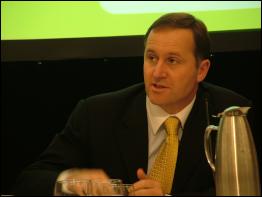
According to National's finance spokesperson John Key, National's leader Dr Don Brash was merely reflecting the 'role he was in at the time' [Reserve Bank Governor] when he decided to publicly endorse neo-liberal free market ideology. In his new role as a potential Prime Minister, John Key told Scoop's Alastair Thompson, Dr Brash would take a 'broader perspective' with regard to the economy and financial policy than he has previously espoused.
Mr Key also told Scoop where some of the job losses in the core state sector would be made should National win the upcoming election.
"We wouldn't continue to run the business development grant and they have around thirty to fifty people that support those [grants] at NZTE [New Zealand Trade and Enterprise]," said Mr Key.
Mr Key was confident that because the state sector hired some 'very good people' that, in his opinion, if the people losing their jobs in the state sector couldn't find anything else, there should be opportunities aplenty in the private sector.
In the same interview Mr Key suggested 'double bunking' could be the answer to the higher cost of National's law and order policy – due to National's proposal to abolish parole. Mr Key also seemed to think that getting the private sector involved in New Zealand's penal institutions would somehow save money – despite figures released last year showing this wasn't actually true.
"Labour closed the Auckland Central Remand Prison– we actually thought this worked quite well and so did the public" explained Mr Key.
A spokesperson for corrections minister Paul Swain, pointed out to A Week of It that Auckland Remand was actually still open and was staffed by pretty much the same people as when run by foreign owned, GEO Corporation.
At the time of the interview Mr Key didn't have a sense of what Winston Peters' coalition bottom lines might be. Later that week at a conference organised by Business New Zealand, Mr Key discovered that Mr Peters considered Key's tax cut package would do nothing to help the New Zealand economy.
Mr Peters did however agree with National that the company tax rate needed to be reduced to 30% - and wanted this done from the beginning of 2006. Due to Mr Key's insistence that middle and lower income New Zealander's need 'tax relief' ASAP, National has stated this won't happen for some years yet.
Given NZ First's dislike of the rest of National's tax cut policy it would seem likely that any National - NZ First Government would have a 30% company tax rate from early next year. It remains to be seen what changes National would have to make to their recently-announced tax package to allow this to happen should they need to rely on NZ First's support after the election.
http://www.scoop.co.nz/stories/HL0508/S00188.htm
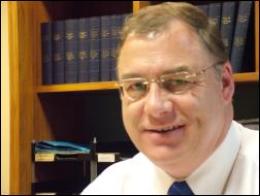
Minimum Wage Left At Bus Stop Whilst Tax Cut Arrives In Limousine
A Week of It's scribe was at the Business New Zealand conference and discovered that United Future and National's policies regarding employment and industrial relations where pretty much identical.
National and United Future both agreed unions had got too big for their boots and were dead keen on getting rid of union power, tinkering with the 'Holidays Act' and making certain employers were never at any disadvantage whatsoever.
National's employment spokesperson Dr Wayne Mapp, assured Scoop in an interview following the conference that the difficulty National had dealing with other potential coalition blocks on the centre right was 'personalities'. United Future MP's however were 'reasonable people' according to Dr Mapp.
Dr Mapp also considered everyone that got a tax cut was going to be a winner under National – no matter how small that tax cut was. Another way of putting money into hard working New Zealanders' hip pockets - raising the minimum wage -looked to be off the agenda in any National-led Government post-election.
"We don't believe it is necessary to move the minimum wage up - that wasn't what we did during the 1990s – we didn't abolish the minimum wage but we didn't constantly shift it up," Dr Mapp told Scoop.
When asked whether the minimum wage increase during the 1990s - from just over six to seven dollars – was enough to cover the cost of living, Dr Mapp was adamant tax cuts were more important.
"We were concerned with reducing taxes – particularly the big package in '96 - we think that is much more important [than raising the minimum wage]"
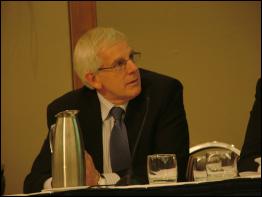
United Future's Leader Peter Dunne seemed perplexed when questioned about how his party could possibly work with Labour given the clear preferences of two of his top four MPs for National. Mr Dunne seemed unable to grasp the fact that was quite obvious to everyone who attended the recent Business NZ conference that Gordon Copeland, United Future's finance spokesperson had virtually no common ground with Labour whatsoever.
Mr Copeland, who, when not trying to snatch the microphone from fellow centre-right politician Rodney Hide's hands, was busy bagging Labour and issuing dire warnings of his good friends fleeing New Zealand refugee-fashion should there ever be a Labour-Green government.
"I know people who if we end up with a Green-Labour Government on 17 September intend to move to Australia and they're good people and I don't want that to happen," railed Mr Copeland to sniggers from the audience.
Mr Copeland's efforts of scaremongering regarding a possible Labour-Green government are somewhat milder than former ACT Party supporter, celebrity chef and Sensible Sentencing Trust advocate Marc Alexander. In his most recent column the professed atheist was willing to thank a deity he didn't believe in for saving New Zealand from a fate possibly worse than death – a government with Greens at the cabinet table.
"So far in their political career, the Greens have not had the opportunity to carry out much of their agenda - and thank God for that! What will happen if by some chance they become post-election partners with Labour? My guess is that the only business that will do a roaring trade - at least for a while - will be travel agents as they hand out tickets and departure cards to half our population," wrote Mr Alexander.
Despite possibly being the only actual centrist MP in United Future, party leader Peter Dunne may not have to worry about the rantings of his fellow MPs in any future coalition agreements – on current polling he may very well be discussing coalition agreements with a mirror.
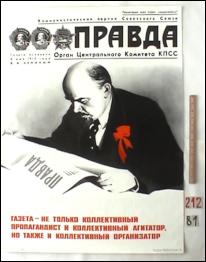
Earlier this week radio host John Banks discovered there is at least one other person that talks as much good honest common sense as himself – Mr Murray McCully. Mr Banks told his good mate Murray that the reason he got up in the wee smalls to broadcast across "god's great garden" was that if he didn't do it his radio spot may be snaffled by a "communist."
Mr Banks then began a diatribe aimed at New Zealand's "communist" media. Mr Banks' hatred wasn't directed at the noble gent that stands in Cuba mall trying to flog the Socialist Workers Weekly for a gold coin though - it was aimed at those well-known communist organisations TVNZ and TV3. Evidently these outposts of latter-day Marxist-Leninism were trying to tear Dr Don Brash 'apart'.
In a McCarthyesque desire to assist Mr Banks, A Week of It has drawn up a list of a select few media types who could act as a bulwark against the ongoing tide of communism (as practised in the free market).
Paul Henry: Mr Henry was once a National party candidate and is now a radio broadcaster and host of TVNZ's Breakfast show. This week Mr Henry helped fight communism by suggesting on Breakfast that the sharemarket had surged because of National's tax cut policy. When Breakfast's business journalist suggested other factors may have been at play, Mr Henry again enthusiastically pointed out the surge was probably all down to National – grab a gold freedom star Mr Henry!
Simon Dallow: Last week on Agenda Mr Dallow assured his fellow right-thinking panellists that Labour's extension of the Working for Families package was possibly aimed at "destigmatising beneficiaries" and explained that Labour's tax relief made even people on "six figures" into "beneficiaries." Luckily for Mr Dallow, it's unlikely his humble income will lead him to ever discover what it's like to be a tax relief "beneficiary". Mr Dallow gets a silver star of freedom.
Paul Holmes: Mr Holmes has three million reasons to defend freedom courtesy of Prime TV. Sadly he won't be assisted by many of his loyal and dedicated staff (now mostly unemployed) – but that's the way the free market works. Thankfully Mr Holmes has a brand spanking new car to help get over the loss of his ratings challenged news and current affairs show.
A bronze star for this media freedom lover, whose career just had a flash flood in the middle of an otherwise golden 15 year long summer.
ENDS


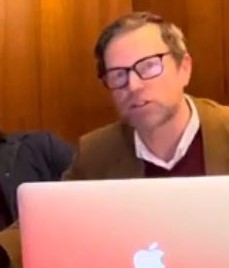
 Keith Rankin: Make Deficits Great Again - Maintaining A Pragmatic Balance
Keith Rankin: Make Deficits Great Again - Maintaining A Pragmatic Balance Richard S. Ehrlich: China's Great Wall & Egypt's Pyramids
Richard S. Ehrlich: China's Great Wall & Egypt's Pyramids Gordon Campbell: On Surviving Trump’s Trip To La La Land
Gordon Campbell: On Surviving Trump’s Trip To La La Land Ramzy Baroud: Famine In Gaza - Will We Continue To Watch As Gaza Starves To Death?
Ramzy Baroud: Famine In Gaza - Will We Continue To Watch As Gaza Starves To Death? Peter Dunne: Dunne's Weekly - A Government Backbencher's Lot Not Always A Happy One
Peter Dunne: Dunne's Weekly - A Government Backbencher's Lot Not Always A Happy One Richard S. Ehrlich: Cyber-Spying 'From Lhasa To London' & Tibet Flexing
Richard S. Ehrlich: Cyber-Spying 'From Lhasa To London' & Tibet Flexing